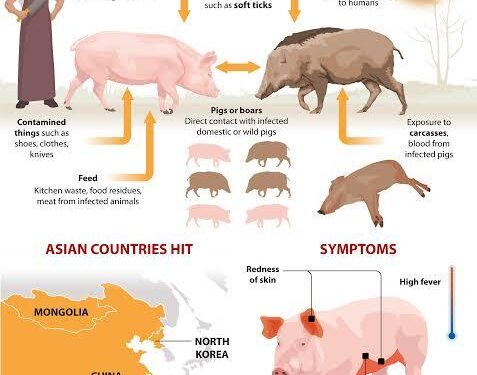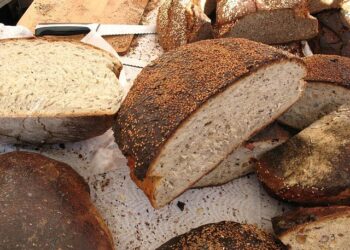Latvia is confronting its largest recorded outbreak of African swine fever (ASF) in 2025, according to the Baltic News Network. The highly contagious viral disease, which poses a severe threat to domestic pigs and wild boar populations, has prompted urgent response measures from veterinary authorities and farmers alike. This unprecedented spread marks a significant challenge for Latvia’s swine industry and raises concerns over regional biosecurity and trade implications.
Largest African Swine Fever Outbreak of 2025 Shakes Latvia’s Pork Industry
Latvia’s pork industry is grappling with unprecedented challenges as the 2025 season records the largest African swine fever (ASF) outbreak in its history. Veterinary authorities confirmed multiple infections across several farms in the eastern regions, prompting immediate quarantines and extensive culling operations. The outbreak threatens not only local production but also exports, with potential ripple effects throughout the Baltic and wider European markets. Experts emphasize that the virus’s rapid spread has been facilitated by wild boar populations and cross-border wildlife migration, complicating containment efforts.
In response to the crisis, government officials and industry leaders have outlined urgent measures aimed at halting the disease’s progression:
- Enhanced biosecurity protocols at commercial pig farms
- Intensified surveillance and testing in high-risk zones
- Temporary suspension of pig transport between affected districts
- Public awareness campaigns targeting hunters and farmers
| Region | Confirmed Cases | Actions Taken |
|---|---|---|
| Latgale | 47 | Quarantine, Culling |
| Vidzeme | 23 | Testing, Transport Ban |
| Gauja National Park area | 15 | Wild Boar Control |
Comprehensive Analysis of Spread Patterns and Economic Impact in the Baltic Region
The recent outbreak of African swine fever (ASF) in Latvia represents the most widespread case recorded in the Baltic region for the year 2025, highlighting a critical shift in the virus’s transmission dynamics. Epidemiological investigations reveal a complex pattern influenced by both natural wildlife movements and human-mediated activities, with wild boar populations acting as primary vectors. Surveillance data show that initial cases emerged near forested border areas before rapidly expanding into intensive pig farming zones, exacerbating containment challenges.
Key factors contributing to the spread include:
- Seasonal migration patterns of wild boars facilitating cross-border transmission
- Inadequate biosecurity measures on small to medium-sized farms
- Transportation routes connecting major agricultural hubs within Latvia and neighboring countries
Economically, the outbreak has triggered significant disruptions in export markets and local livelihoods. The Latvian Ministry of Agriculture estimates that direct losses from culling and farm closures already top ‚ā¨45 million, with indirect costs from trade restrictions and decreased consumer confidence projected to inflate this figure.
| Impact Category | Estimated Loss (‚ā¨ million) | Projected Duration |
|---|---|---|
| Farm Culling & Compensation | 25 | 3 months |
| Export Ban & Trade Losses | 15 | 6 months |
| Veterinary & Monitoring Costs | 5 | Ongoing |
Urgent Containment Strategies and Recommendations for Preventing Future Outbreaks
Immediate action is critical to halt the unprecedented spread of African swine fever (ASF) across Latvia’s pig farms. Authorities have implemented stringent biosecurity measures, including mandatory quarantine zones and rapid culling of infected herds. Enhanced surveillance through systematic testing and increased checkpoints at transportation hubs aim to disrupt the virus’ transmission pathways. Farmers are urged to adhere strictly to disinfection protocols and limit farm access exclusively to essential personnel. The deployment of mobile veterinary units to remote areas further strengthens early detection and containment efforts.
Long-term prevention relies heavily on coordinated strategies combining governmental policies and community awareness. Experts emphasize the necessity of:
- Comprehensive education campaigns to inform farmers and hunters about ASF risks and prevention techniques.
- Strengthening cross-border cooperation with neighboring countries to monitor wild boar populations and regulate trade.
- Improved traceability systems ensuring full visibility of pig movements and product origins.
These measures, paired with investment in research for effective vaccines and rapid diagnostics, are pivotal to safeguarding Latvia’s swine industry and preventing future outbreaks.
| Containment Strategy | Implementation Status | Expected Impact | |||||||
|---|---|---|---|---|---|---|---|---|---|
| Farm Quarantine Zones | Active across high-risk regions | Immediate reduction in virus spread | |||||||
| Wild Boar Population Control | Ongoing culling and monitoring | Lowered risk of cross-species infection | |||||||
Immediate action is critical to halt the unprecedented spread of African swine fever (ASF) across Latvia’s pig farms. Authorities have implemented stringent biosecurity measures, including mandatory quarantine zones and rapid culling of infected herds. Enhanced surveillance through systematic testing and increased checkpoints at transportation hubs aim to disrupt the virus’ transmission pathways. Farmers are urged to adhere strictly to disinfection protocols and limit farm access exclusively to essential personnel. The deployment of mobile veterinary units to remote areas further strengthens early detection and containment efforts. Long-term prevention relies heavily on coordinated strategies combining governmental policies and community awareness. Experts emphasize the necessity of:
These measures, paired with investment in research for effective vaccines and rapid diagnostics, are pivotal to safeguarding Latvia’s swine industry and preventing future outbreaks.
|
















